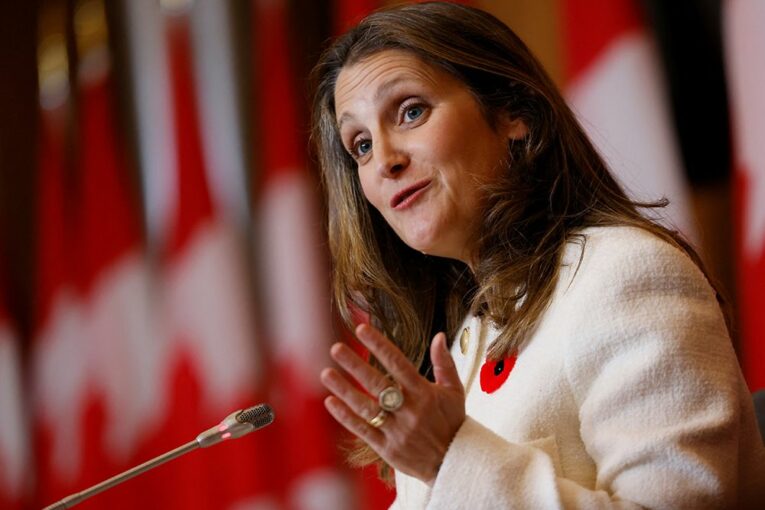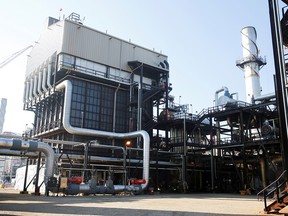
It often feels like the Canadian oilpatch and Ottawa are perpetually locked in a wrestling cage match.
Friday, however, was not one of those days.
Canada’s oil and gas sector still doesn’t like the incoming federal tax on share buybacks that was announced Thursday — one industry investor called it the “epitome of stupidity” — but it is welcoming Ottawa’s attempts to draw investment into decarbonization and clean energy initiatives.
On Friday, the fiscal update by Finance Minister Chrystia Freeland garnered some praise from two producer groups, the country’s largest oilsands operators and the CEO of Canada’s largest pipeline company for taking steps to make the country more competitive with the United States.
Canadian Association of Petroleum Producers president Lisa Baiton said she was “encouraged by a number of key items identified in the federal government’s fall economic statement.”
“You have got to be competitive and … this will try to close the gap so that we get our share in Canada of investment dollars,” Enbridge CEO Al Monaco added on an earnings call.
“There are definitely things we like in there,” said Tristan Goodman, president of the Explorers and Producers Association of Canada. “We like the federal government’s willingness to recognize the competitiveness pressures before us around clean technology. This is a good start.”
For example, the federal economic update this week contains a refundable clean tech tax credit that is worth up to 30 per cent of capital investment in power generation systems for wind, solar and water energy, or from small modular nuclear reactors — an area that oilsands operators have been examining as part of their longer-term decarbonization plans.
It also includes details on a refundable tax credit — initially announced in the spring federal budget — for investment into hydrogen production, another point of interest for some industry players. This credit could be worth at least 40 per cent to the “lowest carbon intensity tier,” the federal document states.
Recommended from Editorial
-

‘Epitome of stupidity’: Oilpatch, investors fume over Ottawa’s new tax on share buybacks
-

Freeland unveils tax credits of 30-40% for investment in clean technology and hydrogen
-

Ottawa reveals plan for new tax on stock buybacks
Leaders with the Pathways Alliance welcomed some of these measures, which are intended to close the gap with new incentives offered in the U.S. Inflation Reduction Act.
“We appreciate the recognition that to kickstart these major projects and technologies, Canada must be on an even playing field with incentives in the U.S. Inflation Reduction Act and with other countries,” Pathways president Kendall Dilling said in a statement.
“New investment tax credits for clean technology, such as hydrogen development and small modular reactors, are another positive step forward.”
However, the federal announcement didn’t include a beefed-up investment tax credit for carbon capture, utilization and storage projects, something the industry and Alberta government have been pursuing as the Pathways Alliance contemplates a $16.5-billion investment in a carbon capture system.

So, consider the statement from the oilsands group more of a pat on the back, instead of a full high five.
In a statement, Baiton noted the economic update included a section devoted to improving regulatory processes for major projects in the country, which includes more funding for the Canada Energy Regulator and Impact Assessment Agency of Canada.
At Enbridge, the Calgary-based pipeline giant is developing renewable energy and major decarbonization projects on both sides of the border.
Monaco indicated he sees promise in some of the federal moves.
“The tax credits for wind and solar support our business here in Canada. There are some references to financial assurance on carbon pricing, which I think is going to be very helpful to carbon capture proponents in Canada … that’s a big opportunity. You have got investment tax credits for hydrogen,” he added.
“It will be attractive for our business here, both in terms of Canada attracting capital, but also for us as specific to our business generally.”
Does this indicate a period of harmony between the two sides?
Jan Gorski, director of the Pembina Institute’s oil and gas program, noted the International Energy Agency’s latest outlook shows demand for fossil fuels falling in all scenarios and said “there’s a need to start preparing for that net-zero future.”
“The industry is at a pretty key juncture right now,” he said. “It’s great to see positive statements from them. I think we still are looking for the kinds of investments that they need to make to start reducing their emissions.”
To be clear, the sector and the Trudeau government aren’t singing from the same song sheet on all matters, such as the incoming emissions cap on the industry and the new tax on share buybacks.
“Industry has no confidence in this government,” one oilpatch CEO said Friday. “What few good ideas (that) do come through tend to be very poorly executed.”
Alberta Energy Minister Peter Guthrie said the tax on share buybacks by public companies will cause “nothing but a flight of capital,” while he expressed disappointment the federal government didn’t expand its CCUS investment tax credit.
“It’s clear that the Trudeau government does not favour the energy sector, and the energy sector particularly in Alberta,” he said Friday. “In fact, I would say that they have a disdain for it.”
On Friday, CAPP added its criticism to the new tax on share buyback, noting it’s double an incoming U.S. levy and could discourage investment into Canadian-run businesses.
So, call it a mixed response from the oilpatch to the federal government’s fall economic update.
After Thursday’s raucous reaction, that seems like progress.
Chris Varcoe is a Calgary Herald columnist.
You can read more of the news on source
